Natalie Grillon is something of a celebrity to me — I’ve been following her work as she’s made her mark within the growing slow fashion movement over the past several years. If you’re not familiar, this movement advocates for sustainable and ethical apparel manufacturing and consumption, leading to a more equitable industry for farmers, producers, brands, and consumers.
In 2009, I interned at Fair Trade USA (a nonprofit that certifies ethically produced goods), lending my college freshman enthusiasm to their apparel pilot program. The concept of fair fashion was in its infancy, and ethical, eco-friendly clothes were largely perceived as expensive hippie-granola-wear. Small brands that were trying to do the right thing couldn’t really compete with industry giants. Though I was eager to learn how we could shift perceptions and put pressure on mass market clothing producers to improve their labor and sustainability policies, it seemed an impossible case to crack.
Then, in April 2013, a month before I graduated, the Rana Plaza building collapse took place in Dhaka, Bangladesh. Over one thousand people lost their lives, many of whom were working in unsafe conditions in a clothing factory that produced fast fashion items for brands including Walmart and Mango. It was a shocking and vital realization for consumers who hadn’t previously given much thought to where their clothes came from. The question was, then, what could we do? There was a massive gap in supply chain transparency between brands, middlemen, and shoppers.
Since the 2013 Rana Plaza collapse, Natalie has worked tirelessly to build accountability in the world of apparel. At the time, she was based in Gulu, Uganda, working with an agricultural development company as an Acumen Global Fellow. “They trained farmers and bought and exported their produce — cotton, sesame, and chili peppers. They established a market in a place that didn’t have one after 20 years of civil war. It was the Holy Grail that you look for in development,” Natalie explains of the company. “A sustainable, market-based organization that was alleviating poverty and changing lives. I was only supposed to stay for a year. I stayed for two. And while I was there I came up with the idea, along with my co-founder Shahd [AlShehail], for Project JUST.”
Project JUST was an online database where consumers could access ethical, social, and environmental data about their favorite fashion brands. Based on its strict criteria, Project JUST also awarded a “Seal of Approval” to the best brands in the industry. The idea was that if consumers were empowered with information, they’d make better purchasing decisions — which could put enough pressure on companies to ultimately transform the industry.
After a few years of growth, Project JUST shut down last winter. Now, Natalie has moved on to a new project in the realm of responsible manufacturing — building the Open Apparel Registry (OAR), an “online map that allows any user to identify an apparel factory or facility globally.” While this platform will be targeted mostly to industry personnel, in contrast to Project JUST’s focus on consumer awareness, it represents a major step toward supply chain transparency.
“With Project JUST, we struggled to find data. Now I’ve gone down the supply chain to figure out why we can’t get info into the hands of consumers. There are a lot of barriers that we have to confront before we can start to provide immediate info on a tag, in the hands of the consumer,” she says.
Natalie’s career evolution, rooted in social impact, is inspiring in itself — but her courage and commitment to digging deep into the fashion industry’s darkest corners is what makes her work so noteworthy.
Foundations for a career in social change
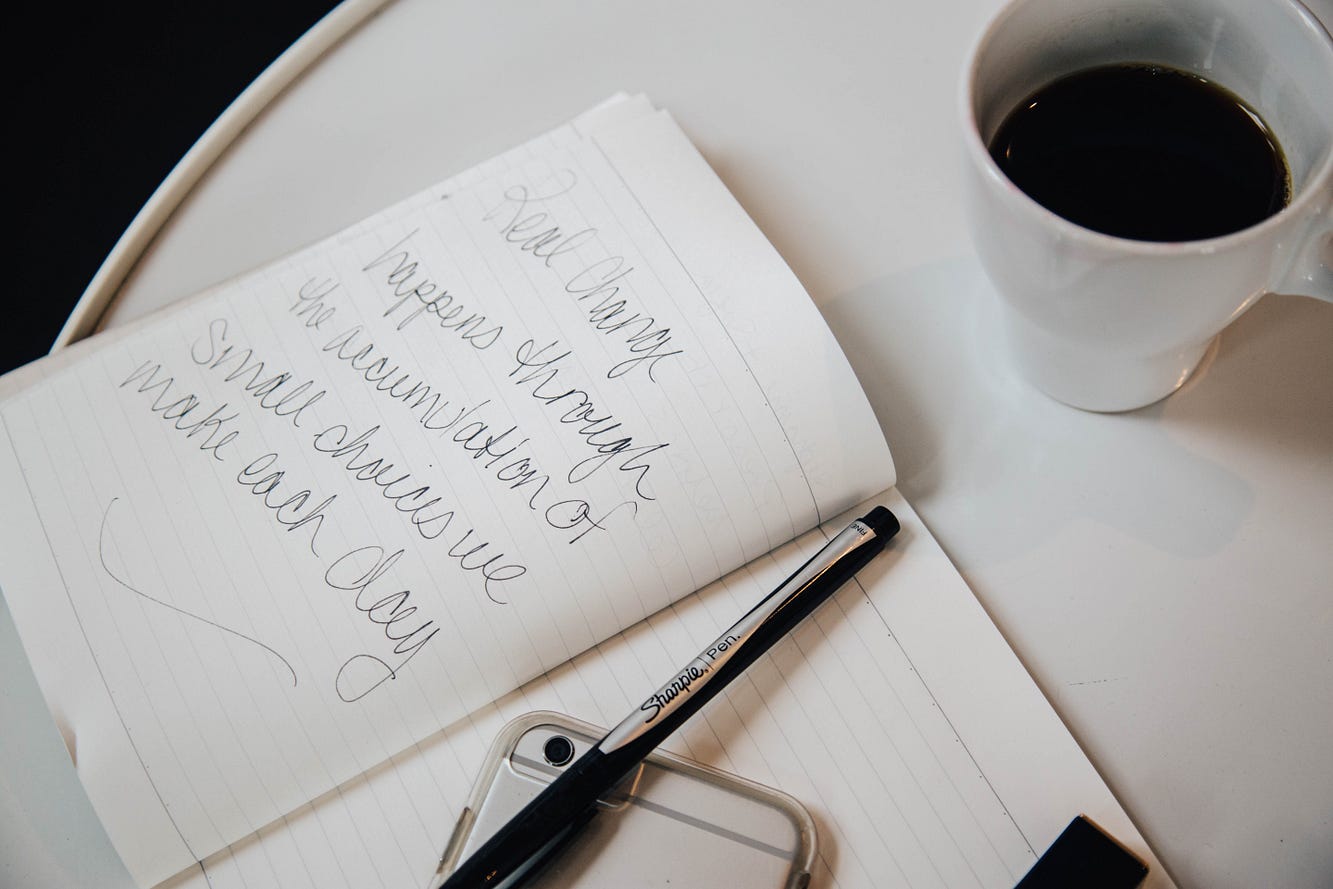
Natalie spent her childhood immersed in nature in the Berkshires, Massachusetts. Her parents’ home was surrounded by woods to explore — a child’s dream — and she recalls that plants and animals were always a presence growing up. Raised in this rural setting by a social worker father and public defender mother, she was naturally oriented toward helping the less fortunate. “My basis in caring about the environment and about people definitely came from my upbringing,” she confirms.
Natalie shipped off to Georgetown for her undergraduate studies, eager to learn about international relations. “I’ve always been curious about how the rest of the world works and different cultures, different politics. So I graduated with a degree in International Politics and then joined the Peace Corps,” she says. “I knew that if I didn’t do it then, being the type A person I was, I would never do it.”
Soon, Natalie found herself in the Timbuktu region of Northern Mali (“which is hilarious. I’m going off to serve in some remote corner of the world and I happen to go to the place that’s the metaphor for that,” she laughs). During her time in the Peace Corps, she found that it was the income-generating and market-based activities that were most effective for alleviating poverty. This realization set her off on a path that she continues on to this day. “Not only did [the experience] affirm my inspiration and desire to serve those who are least advantaged in the world, but it also affirmed my desire to work on a global basis, and it directed me toward more of a business-oriented outlook.”
Turning thought into action
The goal of bringing a business approach to social change led Natalie to pursue an MBA at Cornell University. Of the decision, she explains, “I’d volunteered for NGOs, worked in government during my time at Georgetown, worked at Greenpeace. I thought that that was my space. I knew nothing about business or economics,” she says. “I knew supply and demand, and that was about it.”
Needless to say, she spent her two years back in school absorbing all that she could, focusing particularly on innovative interventions for developing economies. “It falls into the social enterprise space as opposed to traditional aid systems,” she explains. “I messed around with corporate interventions, but came to realize that it was just not fast paced enough, nor impactful enough.”
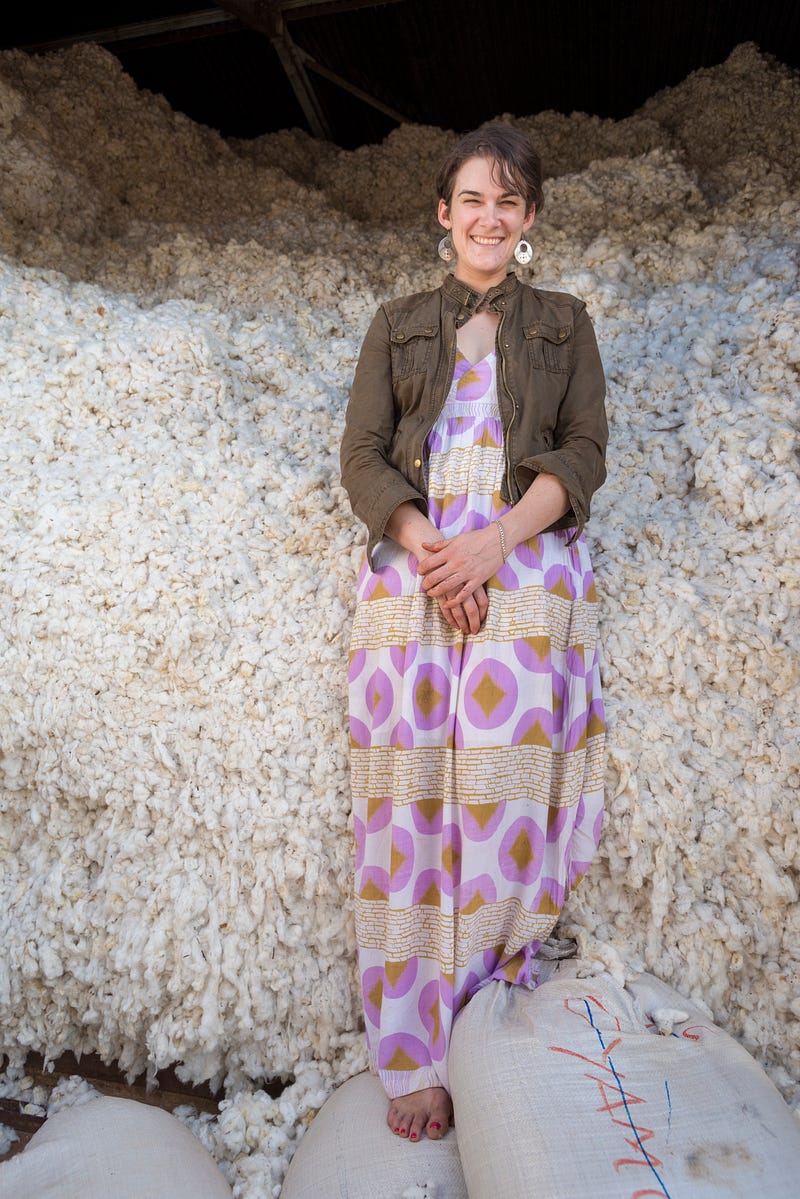
Jacqueline Novogratz, Founder and CEO of Acumen, a nonprofit that invests in sustainable businesses to fight global poverty, eventually came to speak at Cornell. Her fascinating talk prompted Natalie to apply to Acumen’s Global Fellows Program, which she joined after graduation. The program placed her on
the ground in Gulu, working with the aforementioned agricultural social enterprise. Though this was a totally new challenge, she felt prepared and excited about the new opportunity. “[Being in the] Peace Corps is like being an entrepreneur — you come into a place, you have a problem, and you need to develop programs that solve that problem,” she says. “I knew I enjoyed that and enjoyed building things. I felt like the fellowship would be a great way to test that out.”
In Uganda, Natalie watched as farmers grew cotton and sold it to middlemen without any control over or knowledge of where it went and what it would be used for. She connected with Shahd, another Acumen Fellow who was working in India, and they began the initial discussions that would culminate in Project JUST.
“At that time there were fashion brands that were trying to improve upon the sustainability of their supply chains, but they were taking early stage steps. So we started to ask, what would it look like to have a mark for brands that showed that they were good?” Natalie says of Project JUST’s beginnings. “After Rana Plaza, we realized that it wasn’t just that the good stories weren’t getting told to the consumer, but also that the bad stories were hidden. So it became a conversation about helping consumers understand where their clothing came from.”
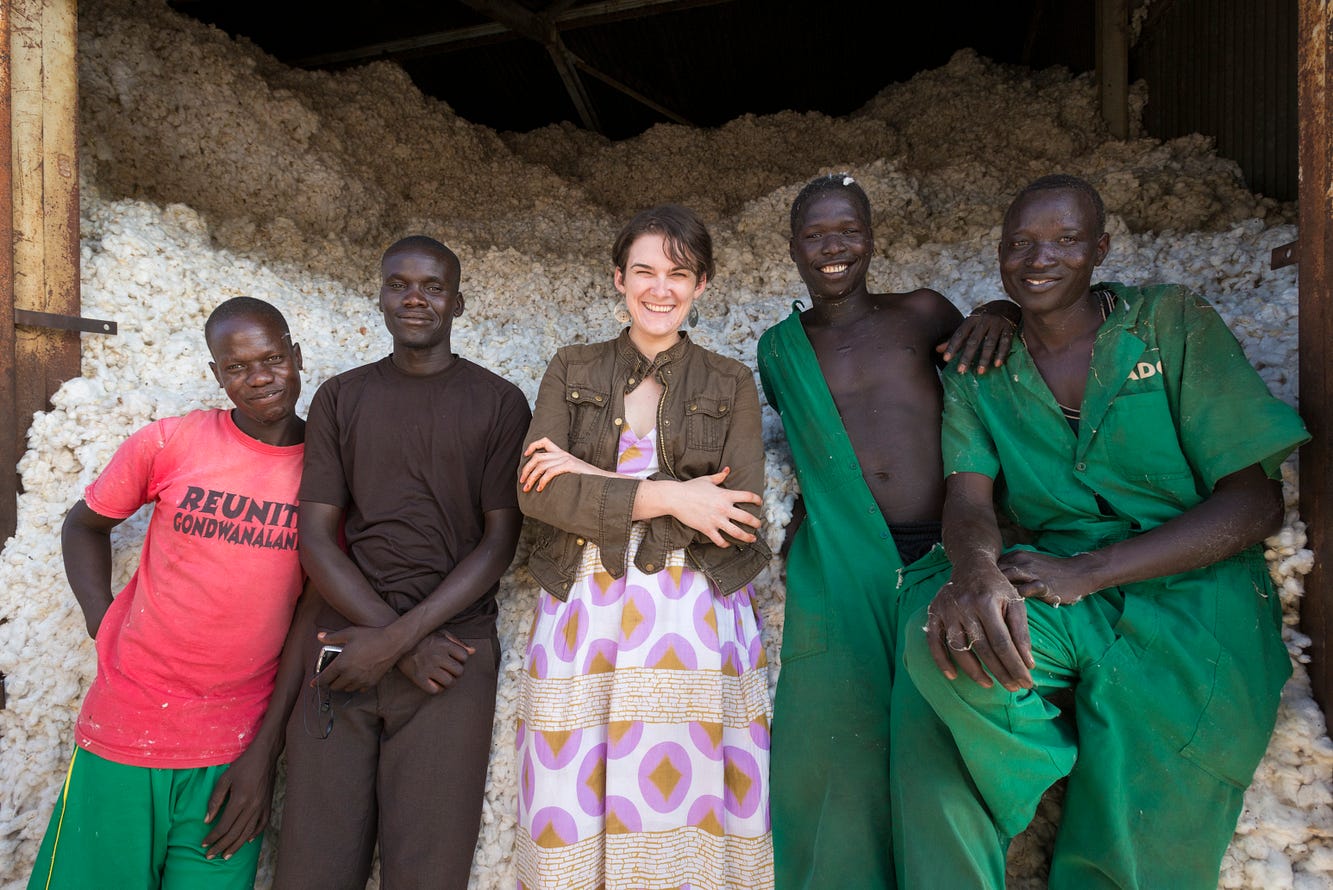
Natalie and Shahd began working on the Project JUST platform in 2013, and launched it in December 2015. “The question was, what information can we give consumers to drive market demand toward accountability? We first developed a wiki where a consumer could easily research and understand what a brand was doing and wasn’t doing. And then we developed the seal of approval, to show consumers the best brands to purchase from.”
In the two years that it was active, Project JUST moved the needle by expanding the database and creating a vast network of consumers, brands, and researchers. The organization garnered a large social following, built partnerships with notable brands, and put on community events (like a holiday market that I volunteered at in Soho). Ultimately, uncertainty regarding the organization’s sustainability became an insurmountable roadblock. “It’s very hard to run an NGO in this sector. There’s not a lot of funding. But it was a great resource, and we still get emails to this day saying ‘we so appreciated it, we wish it was still available!’” Natalie says.
Despite Project JUST closing its doors, Natalie and her team were able to share their principles with other organizations that have cropped up and are continuing the work. “There’s Good on You, WikiRate, Done Good, and other apps. There’s also work being done by RFID [radio-frequency identification] companies like EON, tracing a product from yarn all the way to final post-consumer recycling.”
Moving on from the project wasn’t an easy task, though. Natalie stresses the importance of taking time to process and recoup from perceived failures, something she learned through this experience. “Something people don’t talk about enough is that you have your dips, your lows, and that’s okay. You just have to be patient with yourself. I definitely felt that when we had to shut down Project JUST — it’s taken me about nine months to get back on my feet. It takes time.”
Diving into industry transparency
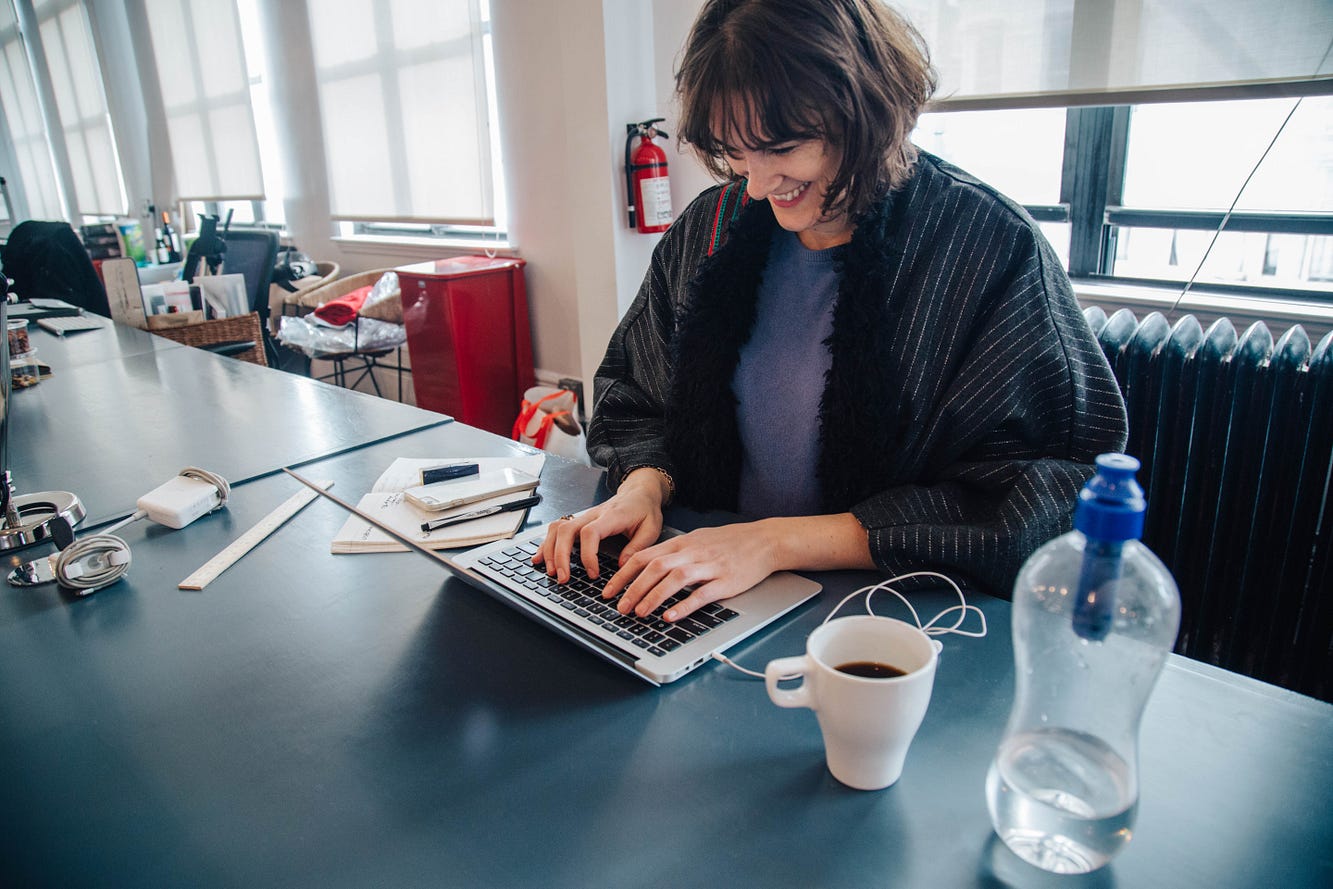
Part of what compelled Natalie to build out the concept for the OAR was the frustration she had experienced when trying to develop research for Project JUST — the data they sought was stuck in a maze behind closed doors. With this learning in mind, she dove headfirst into new conversations with the C&A Foundation, which works to make the fashion industry fair and sustainable, and SourceMap, a supply chain mapping company. The idea was that various data contributors — whether they are brands, retailers, facilities themselves, large multi-stakeholder groups, or even NGOs and unions — could help aggregate a search engine for users to identify factory specifics and affiliated brands.
The technology behind the platform is quite intricate. Not only does it identify facilities, but its algorithm assigns a unique identifier code (sort of like an SSN) to each one, and process names, addresses, and details for accuracy. “There are issues in supply chains with confirming that a factory is where a brand thinks it is, and that the name is actually what it’s supposed to be. There’s so much opaqueness in supply chains, so much subcontracting, so much brokerage.”
Currently, suppliers might be listed by various sources that already exist (like the Sustainable Apparel Coalition or the Social and Labor Convergence Project), but information may differ from platform to platform. Moreover, listed entities don’t have an easy way to connect with one another to verify details and share knowledge. “By uploading your supplier list to the OAR, addresses and names get normalized against our database and you get back corrected info. You also get a list of other data contributors who have uploaded those same factories to the OAR, so you can see affiliations between yourself and other organizations with the same facility. It’s going to open up doors to share data, collaborate at a factory level, and sync software systems, which can’t be done right now.”
The OAR is set to launch to the public this fall (it’s currently in private beta). “It’ll be open data — if I’m a consumer and I want to look at where H&M’s suppliers are, or any brand, I can do that on the OAR.”
Natalie is fully aware of the magnitude of this undertaking, but she remains positive and dedicated to the cause. “I have to be an optimist about the work that we do, otherwise I would bury my head in the sand. And I’m committed to change. I do believe that the industry is headed in the right direction.”
A consumer-powered movement
You might be reading this and wondering, ‘okay, I can get behind this — now tell me what to do.’ Whether you’re an everyday consumer or a retail company executive, there are many ways to stay educated and join the cause. The issues have systemic roots, but individuals can do their part by shifting consumption habits and demanding that brands they love do more and do better.
“A lot of retailers are struggling to survive, so it’s tough to make the big investments that they need to make. But if you’re thinking about the long term and the best decisions for your company, there have to be investments in sustainability and transparency as a part of that vision.” In addition to listing out some brands to most certainly avoid if you’re interested in a clean wardrobe (ahem, Fashion Nova, Missguided, Forever 21 — “their model is inherently unsustainable”), Natalie cites a few big-name apparel companies that are doing some (albeit not enough) good work, like Nike, Adidas, Gap, H&M, Madewell, and Zara. “Are they sustainable companies? No. Is any company 100% sustainable? No. But if you have brands that you like to purchase from, check out their website, understand what they’re doing and make a decision based on what you feel comfortable with.”
She goes on to list some brands that seem to be invested in improving their environmental footprint, like Levi’s, Reformation, Eileen Fisher, and Patagonia. She also mentions consumer-targeted resources like Eco Cult, that offer lists of sustainable and ethical brands for online shoppers to peruse.
Natalie points out that staying educated and spreading awareness are ways of taking action. “Go on Instagram — you’re on there what percentage of the day anyway, so put some knowledge in your feed. There’s Fashion Revolution, and HELPSY, which is a New York based company that does clothing recycling. Follow the NRDC, they do great work. Educate yourself.”
Aside from doing due diligence, avoiding brands that are known offenders, and putting pressure on companies that we know can affect change, Natalie says that it helps to support small, innovative companies: “They’re the ones that are setting the trends and pushing big brands to innovate. So supporting them is not just supporting a small brand, it’s supporting change in the industry.” These brands can sometimes be costlier, but if you can save that once-in-a-while splurge for something that’s ethically and sustainably produced, you’ll be playing a role in pushing things forward.
Shopping vintage or second-hand is another tool in Natalie’s arsenal. “That and recycling your clothes — there’s a lot of clothing that gets thrown in the trash — are the best ways to keep clothing circulating and lowering its impact.”
Overall, Natalie understands that changing your shopping habits isn’t an easy task, but it’s important to try. “Shopping brings people joy. And shopping for different body sizes, knowing brands that fit you right… you want it to be convenient and fun. That’s why the more that we can encourage retailers and brands that people know and love to provide sustainable options, the better.”
Budding social change makers, listen up
It may sound like leadership and entrepreneurship come easy to Natalie, but she stresses that it all takes work. Most important to her, though, is maintaining conviction. “If you think work needs to be done and you have an idea, go for it. We need more people who want to take action, and less people who are like, ‘wow, something really needs to be done.’ Do it. Get involved and help,” she asserts.
For Natalie, finding conviction and courage has been an ever-evolving journey with plenty of ups and downs. She attributes her perseverance to several factors: “It’s partly maturity, partly setting out and succeeding and conquering failures — picking yourself back up and being willing to try again,” she says. “I know this is a cliché but failure is a gift. It sucks, particularly as a type A person, but it strengthens you and makes you a better woman and career person for it.”
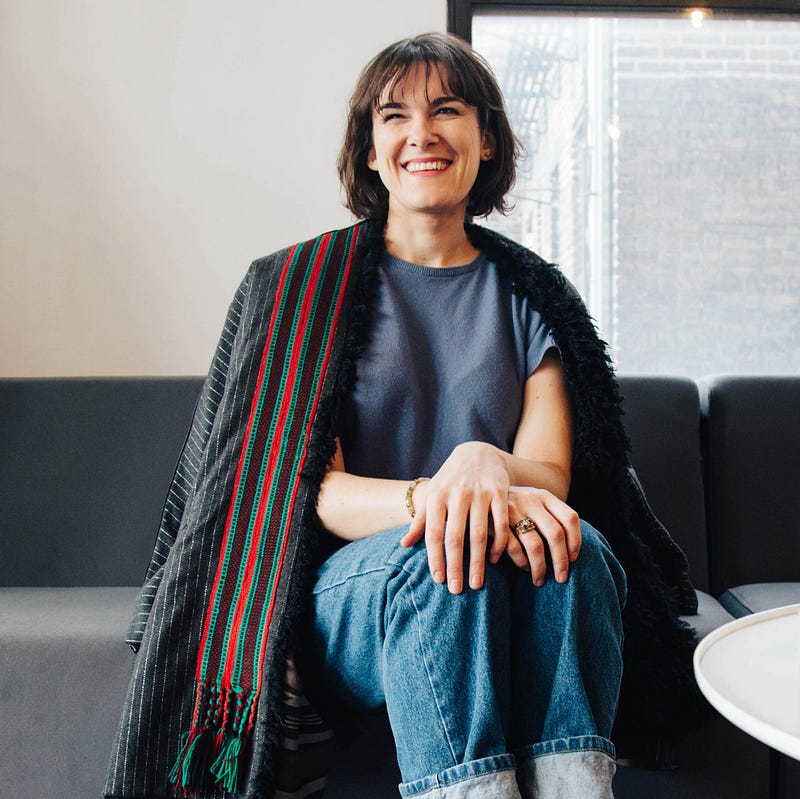
For anyone pursuing a career in social impact, Natalie says it’s necessary to find your “center of hope.” She elaborates on the meaning of this concept, which she first learned of while at Acumen: “Find a community that gives you optimism, strength, courage. The world has made it through hard times because we had activists and motivated people who resisted and worked for change. A center of hope, a community of hope, provides you with the support you need to do the work that’s so needed.”
Natalie’s center of hope in the social impact community extends from her network of likeminded social entrepreneurs at Acumen to other activists in the fashion and apparel space. “I was just talking to Linda Greer at NRDC. I admire the women and men of Fashion Revolution. I’m encouraged by union organizers on the ground. It’s really motivating to me to have conversations with people who get the vision and see it as well. That keeps me going.”
Charm and solace in South Williamsburg
Natalie has called New York home since she returned to the States from Uganda. She started out in an apartment on the edge of SoHo and Little Italy — a great spot to get her footing in the city — then spent time living in Flatbush, which she describes as a “cool neighborhood that still has that New York diversity.”
With her then-boyfriend-now-husband and two dogs, she moved into her current apartment, a studio loft in South Williamsburg. In a historic building full of quaint quirks that’s steps from the new Domino Park, Natalie and her husband have found home.
When asked about her favorite spots to eat and hang out in the area, her eyes light up. “[My husband and I] eat out way too much! Marlow and Sons and Diner are two blocks from us, and Donna is on the corner. There’s this coffee shop called Blank Cafe that has the best iced coffee I’ve ever had in my life,” she says.
Other local eateries and cafes she loves include Bia (“budget-friendly Vietnamese”), Butler (“great place to treat ourselves to a pastry”), Rabbithole (“amazing dinner and brunch — definitely have the scones!”), Barano (“great for Italian date night”), and Homecoming (“flowers just make me happy”). When it comes to shopping, Natalie adores all of Williamsburg’s vintage offerings. She also frequents Swords-Smith, where she enjoys discovering new designers, and Brother Vellies — “I can’t stop buying their shoes even though they’re outside my budget!”
Though she works a lot, Natalie clearly enjoys her New York City lifestyle thoroughly, expressing her opinion that “it’s the greatest city in the US, and definitely up there on the list of greatest cities in the world!” (I think I have to agree.)
During our conversation, Natalie made an important point about the business of change making. If you’re looking to dedicate your life to a cause, it’s vital to understand that there is always a bigger picture at play and that change has to be iterative. She underscores, “Things work in systems. You don’t have control over what happens in the world, and all you can do is your best. Do what feels right. Get advice. Work hard. And know that there are just some things that are out of your control.”
Learn more about the Open Apparel Registry here. Want to add to the discussion about slow fashion? Reach out to Nooklyn Stories on Facebook, Instagram, or Twitter.
Photo Credits
1-2) Photo courtesy Front of House NYC
3-4) Natalie in Uganda. Photo by Peter Weld
5-6) Photo courtesy Front of House NYC